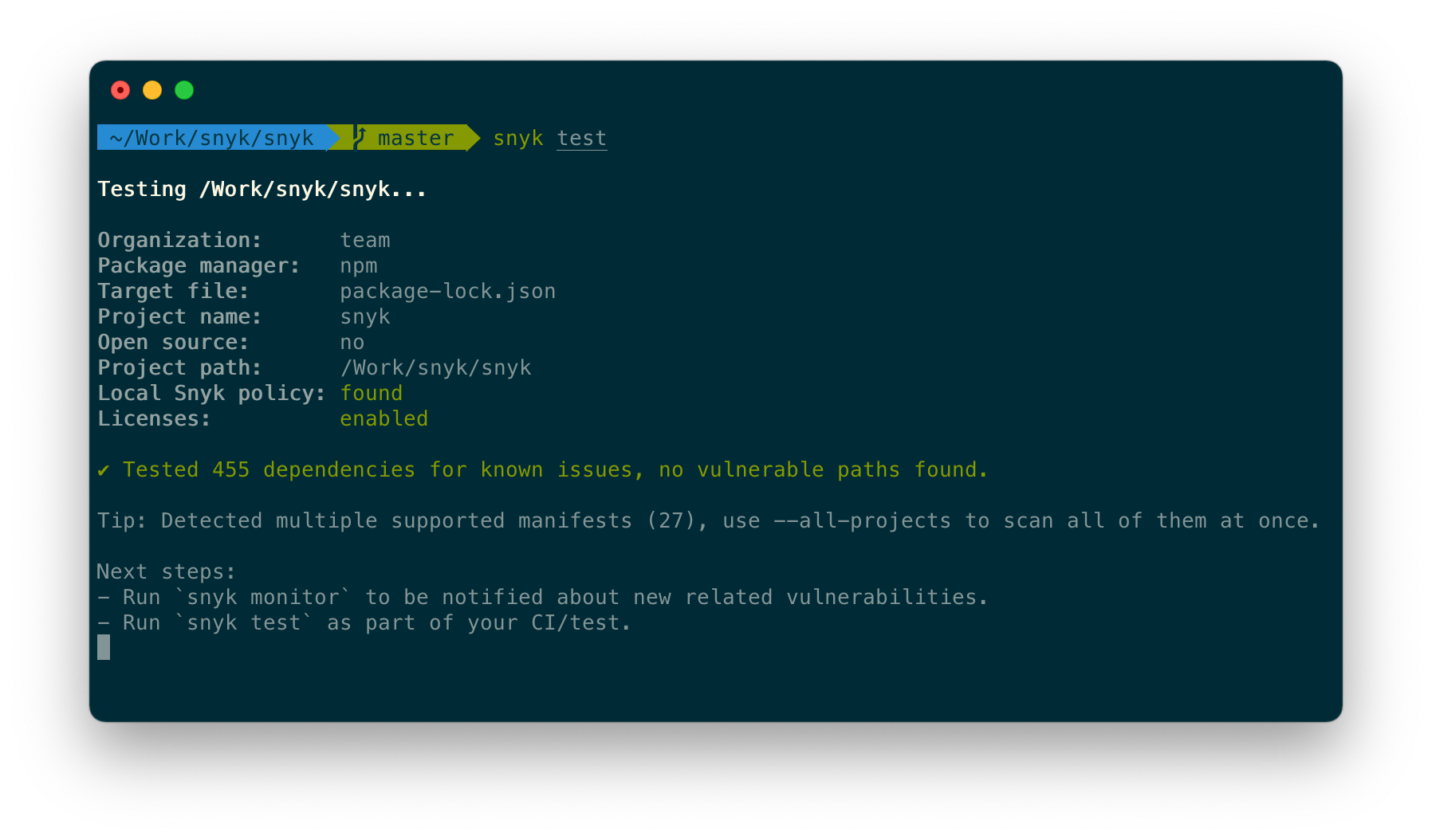Snyk scans and monitors your projects for security vulnerabilities.
What is Snyk?
Snyk is a developer-first cloud-native security tool. It covers multiple areas of application security:
- Snyk Open Source: Find and automatically fix open source vulnerabilities
- Snyk Code: Find and fix vulnerabilities in your application code in real time
- Snyk Container: Find and fix vulnerabilities in container images and Kubernetes applications
- Snyk Infrastructure as Code: Find and fix insecure configurations in Terraform and Kubernetes code
Learn more about what Snyk can do and sign up for a free account »
Snyk CLI brings the functionality of Snyk into your development workflow. It can be run locally or in your CI/CD pipeline to scan your projects for security issues.
Snyk supports many languages and tools, including Java, .NET, JavaScript, Python, Golang, PHP, C/C++, Ruby, Scala and more. See our Language Support documentation.
CLI also supports Docker scanning and Terraform, k8s and other Infrastructure as Code files scanning.
Snyk CLI can be installed through multiple channels.
Snyk CLI is available as an npm package. If you have Node.js installed locally, you can install it by running:
npm install snyk@latest -gor if you are using Yarn:
yarn global add snykStandalone executables (macOS, Linux, Windows)
Use GitHub Releases to download a standalone executable of Snyk CLI for your platform.
We also provide these standalone executables on our official CDN. See the release.json file for the download links:
https://static.snyk.io/cli/latest/release.json
# Or for specific version or platform
https://static.snyk.io/cli/v1.666.0/release.json
https://static.snyk.io/cli/latest/snyk-macosFor example, to download and run the latest Snyk CLI on macOS, you could run:
curl https://static.snyk.io/cli/latest/snyk-macos -o snyk
chmod +x ./snyk
mv ./snyk /usr/local/bin/You can also use these direct links to download the executables:
- macOS: https://static.snyk.io/cli/latest/snyk-macos
- Windows: https://static.snyk.io/cli/latest/snyk-win.exe
- Linux: https://static.snyk.io/cli/latest/snyk-linux
- Alpine: https://static.snyk.io/cli/latest/snyk-alpine
Drawback of this method is, that you will have to manually keep the Snyk CLI up to date.
Install with Homebrew (macOS, Linux)
Install Snyk CLI from Snyk tap with Homebrew by running:
brew tap snyk/tap
brew install snykScoop (Windows)
Install Snyk CLI from our Snyk bucket with Scoop on Windows:
scoop bucket add snyk https://github.com/snyk/scoop-snyk
scoop install snyk
Snyk CLI in a Docker image
Snyk CLI can also be run from a Docker image. Snyk offers multiple Docker images under snyk/snyk-cli and snyk/snyk (snyk/images on GitHub for more details).
These images wrap the Snyk CLI and depending on the Tag come with a relevant tooling for different projects. For example scanning a Gradle project with snyk/snyk-cli:
docker run -it
-e "SNYK_TOKEN=<TOKEN>"
-e "USER_ID=1234"
-v "<PROJECT_DIRECTORY>:/project"
-v "/home/user/.gradle:/home/node/.gradle"
snyk/snyk-cli:gradle-5.4 test --org=my-org-nameSnyk also offers many integrations into developer tooling. These integrations will install and manage the Snyk CLI for you. For example:
- Snyk Jenkins plugin
- CircleCI Orb
- Azure Pipelines Task
- GitHub Actions
- IntelliJ IDE Plugin
- VS Code Extension
- Eclipse IDE Extension
- Maven plugin
- And many more. See the Integrations documentation
Once you installed the Snyk CLI, you can verify it's working by running
snyk --versionSnyk CLI depends on Snyk.io APIs. Connect your Snyk CLI with Snyk.io by running:
snyk authIf you are already in a folder with a supported project, start by running:
snyk testOr scan a Docker image by its tag with Snyk Container:
snyk container test ubuntu:18.04Or a k8s file:
snyk iac test /path/to/kubernetes_file.yamlSnyk can also monitor your project periodically and alert you for new vulnerabilities. The snyk monitor is similar to snyk test and can be used to create a project on the Snyk website that will be continuously monitored for new vulnerabilities.
> snyk monitor
Monitoring /project (project-name)...
Explore this snapshot at https://app.snyk.io/org/my-org/project/29361c2c-9005-4692-8df4-88f1c040fa7c/history/e1c994b3-de5d-482b-9281-eab4236c851e
Notifications about newly disclosed issues related to these dependencies will be emailed to you.
Snyk is really powerful when you are continuously scanning and monitoring your projects for vulnerabilities.
Use one of our integrations to stay secure.
You can authorize Snyk CLI in your CI/CD programatically:
# Using a SNYK_TOKEN envvar (preferred)
SNYK_TOKEN=<SNYK_API_TOKEN> snyk test
# Or using a Snyk auth command
snyk auth <SNYK_API_TOKEN>
snyk testHere are some flags that you might find useful:
-
--severity-threshold=low|medium|high|criticalOnly report vulnerabilities of provided level or higher.
-
--jsonPrints results in JSON format.
-
--all-projectsAuto-detect all projects in working directory
See all the available commands and options by running --help:
snyk --help
# or get help for a specific command like
snyk iac --help
snyk code --helpWe recommend reaching out via the [email protected] email whenever you need help with Snyk CLI or Snyk in general.
GitHub Issues on any Snyk project are not actively monitored by Snyk support.
This project is open source but we don't encourage outside contributors.
This repository is a monorepo, also covering other projects and tools:
For any security issues or concerns, please see SECURITY.md file in this repository.
Made with 💜 by Snyk
